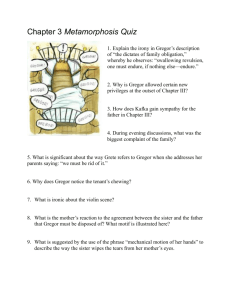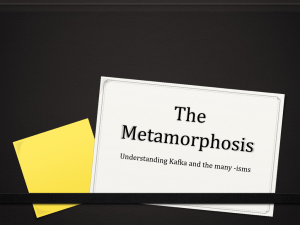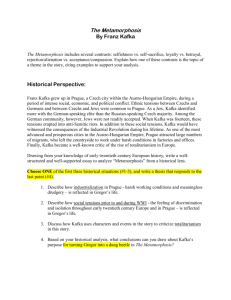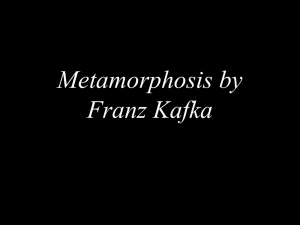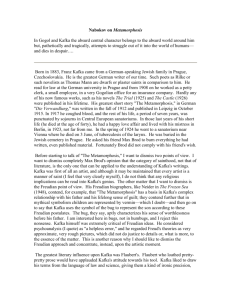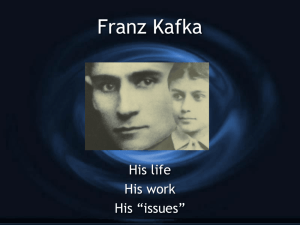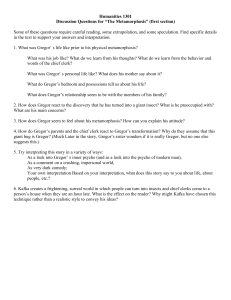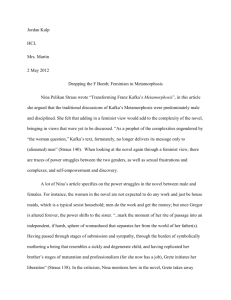The Metamorphosis
advertisement
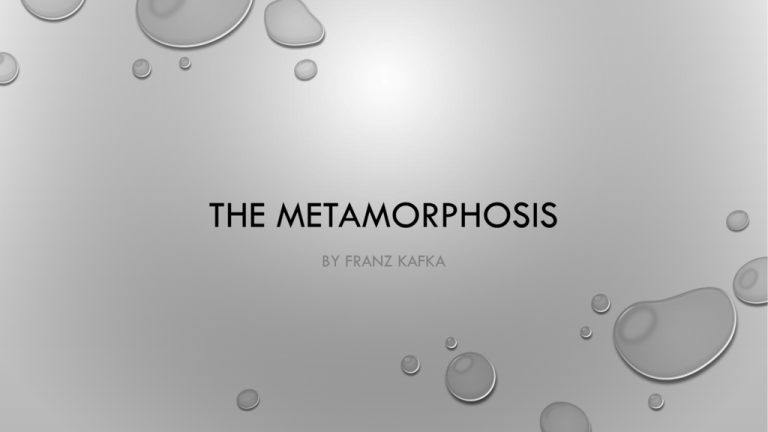
THE METAMORPHOSIS BY FRANZ KAFKA Literary Style and Technique This novella is an extended literalization of the implications of the metaphor used in its initial sentence. Gregor is metamorphosed into an insectlike species of vermin, with Kafka careful not to identify the precise nature of Gregor’s bughood. German usage applies Kafka’s term, Ungeziefer, to contemptible, spineless, parasitic persons, akin to English connotations of the work “cockroach.” Gregor’s passivity and abjectness before authority link him with these meanings, as Kafka develops the fable by transforming the metaphor back into the imaginative reality of his fiction. After all, Gregor’s metamorphosis constitutes a revelation of the truth regarding his low self-esteem. It is a self-judgment by his repressed and continually defeated humanity. By having Gregor become a bug, Kafka has also accomplished a bitterly parodistic inversion of a traditional motif in fairy tales. In folktales the prince is rescued from his froghood by the princess’s kiss; beauty redeems the beast with love. In Kafka’s version, however, the “beauty,” the sister Gregor loves, is horrified by her beastlike brother and condemns him to die rather than changing him back through affection. The most poignant aspect of the story is the inextinguishable beauty of Gregor’s soul, as he consents to his family’s rejection of his humanity and dies on their behalf. Kafka illustrates Gregor’s subjection to his father by the implied parable of the episode involving the lodgers. This triad duplicates the Samsa triad that excludes Gregor, with the middle lodger, like Mr. Samsa, exerting authority over his supporters. Initially they intimidate and threaten the Samsas. After Gregor’s death, however, Mr. Samsa curtly orders these boarders out of the apartment, and they accede without a struggle—their apparently awesome power proves spurious. Equivalently, had Gregor found the self-confidence to revolt openly against both his firm and his father, had he walked out on his job and asserted his autonomy against his family’s clutches, he, too, could have matured into triumphant adulthood and would not have needed the disguised hostility of his metamorphosis. Point of View The story is told in the third person but is for the most part limited to Gregor's point of view. Only his thoughts and feelings are presented, and most of the events are seen through his eyes. The point seems to be to present a picture of Gregor and the world as he understands it, both before and after his metamorphosis. This does not necessarily mean that all of Gregor's judgements are to be accepted; on the contrary, Kafka uses irony and black comedy to indicate that Gregor is at times misled, for instance in thinking he can still go to the office even after becoming an insect and, more sadly, in thinking his family is putting his interests first. Of course, after Gregor's death, the point of view has to shift; it becomes simply impersonal third-person narration, remaining on the outside of the surviving characters, not revealing their thoughts and feelings the way Gregor's were revealed earlier. Interestingly, Gregor's parents are now referred to impersonally as Mr. and Mrs. Samsa; earlier, when the story was being told from Gregor's point of view, they were invariably referred to as Gregor's father and Gregor's mother. The point of this shift seems to be to emphasize that Gregor is not just gone but forgotten. Historical Context For most of Kafka's lifetime, his home town of Prague was a Czech city within a German-speaking empire, the Austro-Hungarian Empire. Only at the end of World War I did that Empire disappear, leading to the creation of an independent Czechoslovakia. But in 1912, when Kafka was writing The Metamorphosis, the Czechs had not yet won their independence, and despite its Czech majority, Prague was dominated by a German-speaking elite. Recognizing where the power lay in the city, the Jews of Prague tended to identify with the German minority rather than with the Czech majority; the Czechs therefore considered the Jews to be part of the German community, but the Germans themselves did not. As a result, it was easy for the Jews to feel that they did not fit in anywhere. In general, Prague was a city of ethnic tensions, primarily between Czechs and Germans and between Czechs and Jews. In 1897, when Kafka was fourteen, the tensions erupted into anti-Semitic riots started by the Czechs. Thus Kafka would have grown up knowing hatred and hostility as well as the difficulty of fitting in. Economically, the late nineteenth century marked the culmination of the Industrial Revolution in Europe. Industrial development was not as advanced in the Austro-Hungarian Empire as elsewhere in Europe, but within the Empire, Prague was one of the most advanced and prosperous cities. However, along with the prosperity created by the new industrialism came dislocation and disruption of the old ways, largely as a result of the shift of large numbers of people from the countryside to the city. Industrialization also meant the appearance of large numbers of jobs, for both factory and office workers, which were pure drudgery. And as if recognizing the need to train people for such jobs, the school system enforced a system of rote learning that seemed relentlessly joyless—at least it seemed joyless to young Kafka, who hated school, just as he hated his first full-time job. Prague was a cultured city, full of newspapers, theatres, and coffee-houses where avant-garde literary types could discuss the latest intellectual fashions. Kafka was a regular at two of these coffee-houses, the Arco and the Louvre, and through the discussions there may have been introduced to new philosophical ideas. He was certainly familiar with the newly published works of Sigmund Freud, referring to Freud in his diary not long before writing The Metamorphosis. However, he was no Freudian disciple and wrote negatively of psychoanalytic theory. He was perhaps more in tune with the major nineteenth-century writers (such as Fyodor Dostoevsky, Friedrich Nietzsche, and Sören Kierkegaard) who wrote pessimistically of life in a meaningless or hostile universe, anticipating twentieth-century existentialism, a movement with which Kafka is sometimes associated. In the year before writing The Metamorphosis, Kafka became familiar with a Jewish theatre troupe that visited Prague and put on performances in Yiddish. He even became friendly with one of the troupe's members and tried to promote the troupe by securing introductions for it and writing favorable reviews of its work. It has been suggested that both the tragicomic tone of the Yiddish plays Kafka saw at this time and also the story in one play of an outcast son may have influenced him in writing The Metamorphosis.
